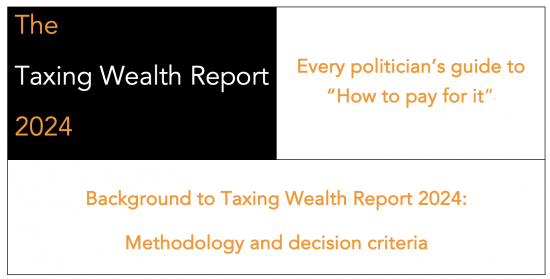Early on in the series on the Taxing Wealth Report 2024, it is quite important to note the criteria that have been used for appraising the benefit of changes that might be made to the tax system as a result of charging high incomes and wealth to more tax in the UK. I have published a note on this issue this morning:

The summary of this note says:
Brief summary
This note suggests that the Taxing Wealth Report 2024 is based on four related conceptual ideas that raise issues that need to be addressed if additional tax revenues are to be raised in the UK in a way that is fair to all taxpayers. These are:
- The creation of horizontal tax equity, which requires that all incomes of similar amount be taxed the same sum irrespective of where that income comes from.
- The creation of vertical tax equity, which requires that as a person's income increases the amount of tax paid on it will always increase irrespective of its source, with a progressive tax system resulting as a consequence.
- The identification and elimination of tax gaps, which are the differences between the tax revenues that a jurisdiction should be able to collect and the tax revenues it actually recovers during the course of a period.
- The identification and elimination of tax spillovers, which are the negative consequences of the interactions between different tax systems or different parts of the same tax system that can often (sometimes unintentionally) reduce tax revenues and the size of a tax base.
Tax spillover assessments identify the causes of tax gaps and so, in turn, the reasons why horizontal and vertical tax equity do not exist within a tax system.
Whilst addressing these issues the note makes clear that the Taxing Wealth Report 2024 uses microeconomic theory to justify:
- The recognition of all sources of increase in the financial well-being of a person as being of equal value to that person and that all such sources should, as a result, be subject to equal rates of taxation. This recognition does, as a result, remove the distinction that is commonplace in tax between earned and unearned income and income, capital gains and capital receipts, all of which are considered as equal for these purposes.
- The idea that progressive taxation is equitable because of the reducing marginal utility of each additional sum received by a person as a contribution to their financial well-being during the course of a period.
Discussion
For those not familiar with the terms used, the links to the glossary associated with this blog will help add detail, especially in the case of tax spillovers and the tax gap, as will reading the note I have published.
At the core of the proposal is microeconomic theory that, in this case, few will be able to argue with. The tax concepts are all familiar to those with experience of tax justice, which has always had as one of its goals the fairer distribution of resources within a society and between societies.
It is, of course, possible to disagree with the noted ideas. But those doing so need to explain why they think the tax system should be used to promote inequality within society because that is, I suggest, what they would be doing.
The note that supports this blog post is available here.





